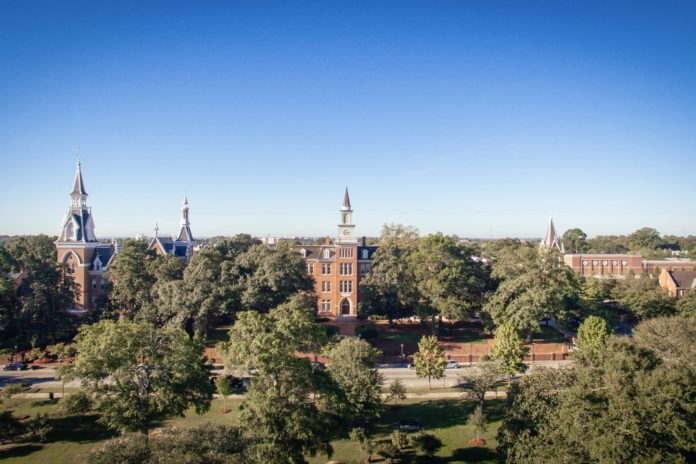SAVANNAH – A new 60,000-square-foot, state-of-the-art cancer research and education facility – dedicated the William and Iffath Hoskins Center for Biomedical Research – celebrated its grand opening last week on the Memorial Health University Medical Center (MHUMC) campus. MHUMC is one of two teaching hospitals for the Mercer University School of Medicine.
“Mercer has been in partnership with Memorial Health University Medical Center since the mid-1990s,” said William D. Underwood, president of Mercer University. “One-third of our third- and fourth-year students complete their medical education at Memorial. This wonderful facility is the logical next step in enhancing medical education opportunities for our students.”
The new cancer research and education facility is designed for medical and translational research. Translational or “bench to bedside” research allows scientists and physicians to work together to quickly translate laboratory findings into new cancer treatments or prevention techniques.
The $22-million, two-story building has 30,000 square feet of space devoted exclusively to cancer research, including research on the molecular genetics and biology of cancer. The facility also includes classrooms for medical students from Mercer’s School of Medicine.
“The facility houses a new student lounge and a virtual education center,” said Edward E. Abrams, D.Ed., who serves as associate dean for the School of Medicine’s Savannah campus and as executive director of medical education at Memorial Health. “It is an excellent venue for medical education on this campus.”
There are also classrooms open to any educational needs the students may have, and two computer labs for student use. A virtual lab, said Abrams, includes medical simulations and a surgical suite for educational purposes. The multipurpose room, which bears Mercer’s name, is a versatile space that can seat 250 in theater style and 180 in rounds.
Although most of Mercer’s medical students will be involved in their clinical rotations, Abrams said there may also be opportunities for them to become involved in basic science research. “Because many of the students have extensive backgrounds in the basic sciences, I would like to develop summer scholarships to allow them to receive stipends while involved in research. Some residents are required to take part in research, so this will also offer new opportunities for them.”
The new education and research facility is expected to have a major impact on southeast Georgia’s economy. Its presence should attract world-class clinical researchers and physicians to the area, and may also make southeast Georgia more attractive to science-based industries, such as pharmaceutical companies.
Jeff Boyd, Ph.D., vice president for laboratory science at Memorial Health and internationally respected scientist in molecular cancer research, leads the team of scientists at the Hoskins Center. These scientists were recruited to Savannah from such prestigious facilities as Memorial Sloan-Kettering Cancer Center in New York, Fox Chase Cancer in Philadelphia, and the National Cancer Institute in Bethesda.
“This new facility would not have been possible without the generosity of Curtis and Elizabeth Anderson, Mercer University School of Medicine, the support of U.S. Congressman Jack Kingston, and the Federal Health Resources and Services Administration,” said Robert A. Colvin, president and CEO of Memorial Health. “Because of their generosity and the generosity of others, Memorial Health is on its way to becoming a nationally recognized cancer center.” The U.S. Department of Health and Human Services, Health Resources and Services Administration also awarded a “Health Care and Other Facilities” grant to Memorial Health Foundation, Inc. for a portion of costs related to the design and construction of the research and education building.
The new facility is named in honor of Dr. Iffath Hoskins, an accomplished obstetrician for high-risk patients, and her husband, Dr. William Hoskins, world-renowned gynecological oncologist, director of the Curtis and Elizabeth Anderson Cancer Institute at MHUMC, and professor of obstetrics and gynecology at Mercer’s School of Medicine.
About Memorial Health University Medical Center:
Memorial Health is a two-state healthcare organization serving a 35-county area in southeast Georgia and southern South Carolina. The system includes its flagship Memorial Health University Medical Center, a 530-bed tertiary medical center; CareOne, its two-state home care division; Memorial Health University Physicians, the area’s largest group practice; a major medical education program; business and industry services; and NurseOne, a 24-hour call center. Memorial Health is the only healthcare system in the country to be named a Distinguished Hospital by J.D. Power and Associates and a “100 Best Companies to Work For” by Fortune Magazine. Visit the Memorial Health Web site at www.memorialhealth.com.
About Mercer University and the School of Medicine:
Mercer University’s School of Medicine was established in 1982 to educate physicians and health professionals to meet the primary care and health care needs of rural and medically underserved areas of Georgia. Students entering Mercer University School of Medicine will be graduated from a school that utilizes a problem-based medical education program that provides early patient care experiences. Such an academic environment fosters the early development of clinical problem-solving and instills in each student an awareness of the place of the basic medical sciences in medical practice. The medical school has two teaching hospitals: the Medical Center of Central Georgia in Macon and Memorial Health University Medical Center in Savannah.
Founded in 1833, Mercer University is a dynamic and comprehensive center of undergraduate, graduate and professional education. The University has 7,300 students; 11 schools and colleges – liberal arts, law, pharmacy, medicine, business, engineering, education, theology, music, nursing and continuing and professional studies; major campuses in Macon and Atlanta; four regional academic centers across the state; a university press; teaching hospitals in Macon and Savannah; an educational partnership with Warner Robins Air Logistics Center in Warner Robins and Piedmont Healthcare in Atlanta; an engineering research center in Warner Robins; a performing arts center in Macon; and a NCAA Division I athletic program. For more information, visit www.mercer.edu.










